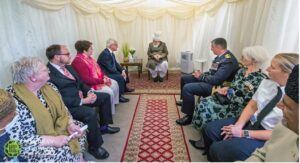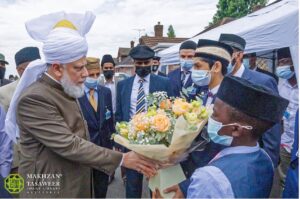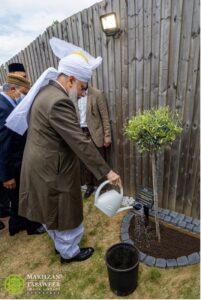No effort should be spared in upholding the peace of society” – Hazrat Mirza Masroor Ahmad
The Ahmadiyya Muslim Community is pleased to announce that on 17th June 2023, the World Head of the Ahmadiyya Muslim Community, the Fifth Khalifa (Caliph), His Holiness, Hazrat Mirza Masroor Ahmad inaugurated the Baitus Salaam Mosque (House of Peace) in Scunthorpe, UK.
Upon arrival, His Holiness officially inaugurated the Mosque by unveiling a commemorative plaque and leading the attendees in a silent prayer before leading the Zuhr and Asr prayers at the new Mosque.
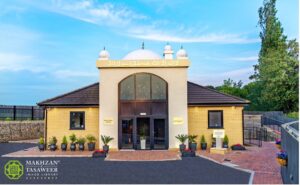
The Ahmadiyya Muslim Community is pleased to announce that on 17th June 2023, the World Head of the Ahmadiyya Muslim Community, the Fifth Khalifa (Caliph), His Holiness, Hazrat Mirza Masroor Ahmad inaugurated the Baitus Salaam Mosque (House of Peace) in Scunthorpe, UK.
Upon arrival, His Holiness officially inaugurated the Mosque by unveiling a commemorative plaque and leading the attendees in a silent prayer before leading the Zuhr and Asr prayers at the new Mosque.
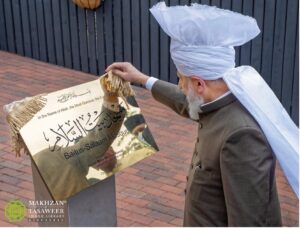
Shortly afterwards, a special reception, attended by over 60 dignitaries and guests, was held at the Mosque premises, to mark the opening of the Mosque.
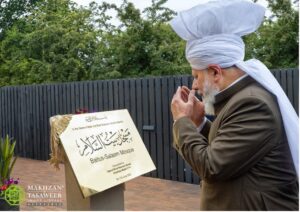
The highlight of the event was the keynote address delivered by Hazrat Mirza Masroor Ahmad during which he highlighted Islam’s teachings of peace and stated that the Mosque would manifest Islam’s “spirit of love, peace and brotherhood.”

His Holiness appreciated the open-heartedness of the local community and authorities who permitted the Ahmadiyya Muslim Community to build the Mosque and attended the event.
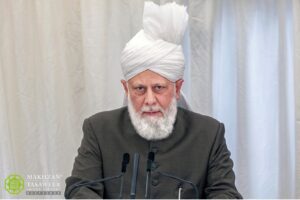
His Holiness said that within society, Islam is often portrayed as a religion of extremism, whereas that could not be further from reality.
Addressing such fears directly, Hazrat Mirza Masroor Ahmad said:
“Some of you (members of the local community) may even fear that the opening of this Mosque will lead to a new chapter in the history of extremism being written in your local community. In this regard, rest assured that nothing could be further from the truth. Islam’s teachings are diametrically opposed to all forms of extremism or terrorism. Islam rejects all forms of violence and teaches peace and harmony and desires for the people of all beliefs and religions to live amicably together with a spirit of mutual tolerance and compassion. It calls for members of society to unite as human beings, irrespective of their differences, in a common cause of establishing peace and security for all mankind.”
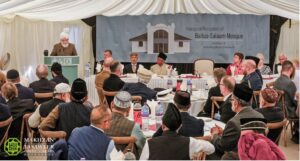
Speaking of how the Mosque will serve to highlight the beautiful principles of Islam, Hazrat Mirza Masroor Ahmad said:
“In terms of the objectives of Mosques, on one occasion, the Founder of the Ahmadiyya Muslim Community (peace be upon him) stated that if a person wishes to raise awareness of Islam in any town or place, they should build a Mosque in that area. By this, he meant that if a Mosque is built, non-Muslims will naturally come to observe Islam’s teachings and see how it promotes a spirit of love, peace and brotherhood amongst all people. They will see with their own eyes that, where Muslims are duty-bound to fulfil the rights of Allah the Almighty, the teachings of Islam also require them to fulfil the rights of humanity and to seek the very best for all people, irrespective of their faith or beliefs.”
His Holiness went on to prove from the Islamic scripture how the image of Islam created by extremists is completely at odds with its actual teachings and mentioned that the very purpose of building mosques is to bring about peace.
Hazrat Mirza Masroor Ahmad said:
“Wherever Muslims build Mosques, they are built to emulate and spiritually mirror the true objectives of the first House of God, the Holy Kaa’bah in Makkah, which is the most sacred and holy place in Islam… Regarding the Kaa’bah, chapter 3, verse 98 of the Holy Quran states that whosoever enters the Sacred House of Allah ‘enters peace’ – meaning that a true Muslim, upon entering a Mosque, shall himself enter a state of peace, and shall be a guarantor of peace and security for others.”
To further highlight Islam’s teachings that negate all forms of extremism, His Holiness quoted chapter 25 verse 64 of the Holy Quran which states:
“And the true servants of the Gracious God are those who walk on the earth humbly and when the ignorant address them, they avoid them gracefully by saying, ‘Peace’!”
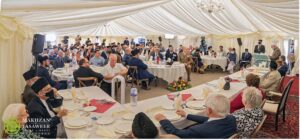
Explaining the verse, Hazrat Mirza Masroor Ahmad said:
“Muslims are taught that no effort should be spared in upholding the peace of society – to the extent that the Quran instructs Muslims to walk away in the face of intense provocation and offer ‘Salam’ – that is greetings of ‘peace’ – to ignorant and abusive people who speak harshly or seek confrontation. Essentially, Islam commands Muslims to show the utmost restraint at all times and teaches that true strength of character lies not in responding to hateful attacks or offensive rhetoric in a like fashion but rather by demonstrating patience and upholding the peace of society.”
His Holiness mentioned that though the early Muslims took part in battles, they were defensive wars fought in extreme circumstances for the sake of “establishing peace, upholding human rights and ensuring freedom of belief and conscience prevailed in society.”
His Holiness quoted and explained verses 40-41 of the 22nd chapter of the Holy Quran, in which the early Muslims were permitted to defend themselves after years of sustained persecution.
Hazrat Mirza Masroor Ahmad explained the injunction found in chapter 22 verses 40 and 41 of the Holy Quran and said:
“Allah the Almighty declares that permission to fight was granted to the early Muslims because they were being mercilessly attacked by people who not only sought to destroy Islam but had an even broader agenda – to destroy the institution of religion itself. Indeed, it was their resolute objective and firm intention to bring an end to all forms of religious freedom. Thus, permission for a defensive war was not granted solely to protect Muslims or the religion of Islam. Instead, the Muslims are commanded by Allah the Almighty to protect the places of worship of all faiths, be they temples, churches, synagogues or otherwise.”
His Holiness said certain non-Muslim scholars who had carried out diligent research into early Islamic history acknowledged that Islam’s message was one of peace and unity.
His Holiness quoted the American academic, Dr Craig Considine who has written the book, ‘People of the Book: Prophet Muhammad’s Encounters with Christians’, which states:
“Muhammad and the believers of the early ummah (Muslim community) created a nation founded upon ally-ship, civility, cross-cultural interactions, freedom of conscience, freedom of religion, freedom of speech, interreligious dialogue, mutual dependency, and religious pluralism.”
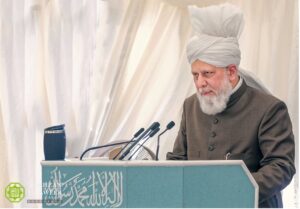
His Holiness went on to speak about how the modern-day wars are all for political reasons, and wherever the name of Islam is used, it is only for vested interests.
Hazrat Mirza Masroor Ahmad said:
“Today, religious wars are no longer taking place. Rather, the conflicts we observe today are geopolitical in nature. If Muslims or Muslim nations are taking any part, it is to fulfil their political ambitions and vested interests and not motivated by their religion… In addition, it is wrong to suggest that conflict is limited to Muslim countries. The non-Muslim world is also engaged in warfare, as we see most prominently in Ukraine. Hence, as I have said, the wars taking place today are for territorial or political objectives, and it would be wholly unfair to link them to any religion or religious beliefs.”
His Holiness went on to speak of how Islam’s peaceful teachings inspire the Ahmadiyya Muslim Community to try and alleviate hardships in the world.
His Holiness gave example of how the Ahmadiyya Muslim Community is making efforts to provide the basic amenity of water in places where there is no easy access to it.
Hazrat Mirza Masroor Ahmad said:
“Living here in the West, it is impossible to fathom the dire situation in those under-developed nations where it is common for people to walk for miles every day to fill buckets of water for their daily use…When our volunteers travel to those distant and challenging lands and install water pumps or wells in their communities, the happiness and elation of the local people is beyond all measure. It is inconceivable for people living in the developed world to understand the sense of unbridled joy they feel. Having clean water flow from a tap at their doorstep is a genuinely life-changing experience for such people. Only if you have seen it with your own eyes can you begin to understand their joyful emotions.”
His Holiness said that such services are provided to people irrespective of their faith and motivated by Islamic teachings.
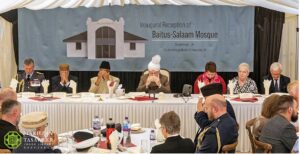
Hazrat Mirza Masroor Ahmad said:
“Our efforts are underpinned and inspired by the teachings of Islam and are rendered purely for the sake and betterment of humanity. We consider the burdens of the weakest members of society as our own and that it is our duty to provide help and comfort to all those who are in need or vulnerable. In short, Islam’s teachings oblige us to live peacefully and to co-exist with other people.”
Concluding his address, Hazrat Mirza Masroor Ahmad said:
“This Mosque has been named the ‘Baitus Salam Mosque’, which literally means the ‘House of Peace’. And, in accordance with this name, I am confident that the local Ahmadi Muslims will be those who foster peace and love in society, observe the laws of the land and excel in serving their community and the wider society. God Willing, they will forever reflect the true teachings of Islam.”
![]()
Before the keynote address, the Regional President of the Ahmadiyya Muslim Community, Dr. Muzaffar Ahmad and three guest speakers took to the stage to congratulate the Ahmadiyya Muslim Community on the opening of the new Mosque.
The guest speakers included Holly Mumby-Croft, Member of Parliament for Scunthorpe, Martin John Vickers, Member of Parliament for Cleethorpes and Councillor Janet Longcake, Mayor of North Lincolnshire Council.
